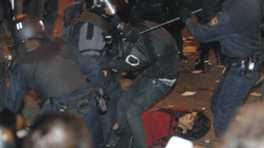 Leonardo Boff
Leonardo Boff
Estamos constatando que existe actualmente mucho odio y mucha rabia en la sociedad, sea por la situación general de insatisfacción que atraviesa la humanidad, sumergida en una profunda crisis civilizacional, sin que nadie pueda decirnos cómo superarla ni hacia donde nos podría conducir este vuelo ciego. El inconsciente colectivo detecta este malestar como ya antes lo describiera Freud en su famoso texto El malestar en la cultura (1929-1930) que, de alguna forma, preveía las señales de una guerra mundial.
Nuestro malestar es singular y deriva de las varias victorias del PT con sus políticas de inclusión social que han beneficiado a 36 millones de personas y elevado 44 millones a clase media. Los privilegiados históricos, la clase alta y también la clase media se han asustado con un poco de igualdad conseguida por aquellos que estaban fuera. El hecho es que por un lado hay una espantosa concentración de la renta y, por el otro, una desigualdad social que se cuenta entre las mayores del mundo. Esa desigualdad, según Marcio-Pochmann en el segundo volumen de su Atlas da exclusão social no Brasil (Cortez 2014), disminuyó significativamente en los últimos diez años pero todavía es muy profunda, factor permanente de desestabilización social.
Como bien lo notó el economista y buen analista social del partido del PSDB, Luiz Carlos Bresser Pereira, y fue asumido en su columna dominical (8/3) por Verissimo, tal hecho «hizo surgir un fenómeno nunca antes visto en Brasil, un odio colectivo de la clase alta, de los ricos a un partido y a un presidente; no es preocupación o miedo, es odio…; la lucha de clases volvió con fuerza, no por parte de los trabajadores, sino por parte de la burguesía insatisfecha».
Estimo correcta esta interpretación que corrobora lo que escribí en este espacio con dos artículos ¿Qué se esconde detrás del odio al PT? . Es el surgimiento de millones de personas que eran los ceros económicos y que empezaron a adquirir dignidad y espacios de participación social, ocupando lugares antes exclusivos de las clases acomodadas. Esto provocó rabia y odio a los pobres, a los nordestinos, a los negros y a los miembros de la nueva “clase media”.
El problema ahora es cómo desmontar este odio. Una sociedad que se deja llevar por ese espíritu destruye los lazos mínimos de convivencia sin los cuales no se sustenta. Corre el riesgo de romper el ritmo democrático e instaurar la violencia social. Después de las amargas experiencias que hemos tenido de autoritarismo y de la penosa conquista de la democracia, debemos evitar por todos los medios las condiciones que vuelvan el camino de la violencia incontrolable o irreversible.
En primer lugar, en la línea sabia de Bresser Pereira, se hace urgente un nuevo pacto social que vaya más lejos del creado por la constitución de 1988, pacto que reúna a empresarios, trabajadores, movimientos sociales, medios de comunicación, partidos e intelectuales, que distribuya mejor las responsabilidades para la superación de la actual crisis nacional (que es global) y que claramente convoque a los rentistas y a los grandes ricos, articulados generalmente con los capitales transnacionales, a dar su contribución. Ellos también deben ser un Simón Cireneo que ayudó al Maestro a cargar la cruz.
Hay que cambiar no solo la música sino también la letra. En otras palabras, es importante pensar más en Brasil como nación y menos en los partidos. Estos deben dar centralidad al bien general y unir fuerzas en torno a unos valores y principios fundamentales, buscando convergencias en la diversidad, en función de un proyecto-Brasil viable y que haga menos perversa la desigualdad, otro nombre para la injusticia social. Estimo que maduramos para esta estrategia del gana-gana colectivo y que seremos capaces de evitar lo peor y así no gastar tiempo histórico que nos retrasaría más de cara al proceso global de desarrollo social y humano en la fase planetaria de la humanidad.
En segundo lugar, creo en la fuerza transformadora del amor como está expresado en la Oración de San Francisco: donde haya odio, que yo lleve amor. El amor aquí es más que un afecto subjetivo, adquiere una forma colectiva y social: el amor a una causa común, amor al pueblo como un todo, especialmente a aquellos más castigados por la vida, amor a la nación (necesitamos un sano nacionalismo), amor como capacidad de escuchar las razones del otro, como apertura al diálogo y al intercambio.
Si no encontramos ni escuchamos al otro, ¿cómo vamos a saber lo que piensa y pretende hacer? Empezamos entonces a imaginar y a proyectar visiones distorsionadas, a alimentar prejuicios y destruimos los puentes posibles que unen las orillas.
Necesitamos dar más espacio a nuestra “cordialidad” positiva (pues la hay también negativa) que nos permite ser más generosos, capaces de mirar hacia delante y hacia arriba, dejar atrás lo que quedó atrás, y no dejar que el resentimiento alimente la rabia, la rabia el odio, y el odio la violencia, que destruye la convivencia y sacrifica vidas.
Las Iglesias, los caminos espirituales, los grupos de reflexión y acción, especialmente los medios de comunicación y todas las personas de buena voluntad pueden colaborar en desmontar esta carga negativa. Y contamos para eso con la fuerza integradora de los contrarios que es el Espíritu Creador que traviesa la historia y la vida personal de cada uno.
--------------------------------------------------------------------------------
How to dismantle social hatred
Leonardo Boff
Theologian-Philosopher
Earthcharter Commission
We are seeing that too much hatred and anger now exists in society, either due to the general situation of dissatisfaction that humanity is experiencing, overwhelmed by a profound crisis of civilization, without anyone who can tell us how to overcome it or where this flight into the darkness will take us. The collective unconscious detects this malady, as Freud described in his famous text, Civilization and its Discontents, (El malestar en la cultura,1929-1930) that, somehow, foresaw the signs of a world war.
Our unrest is unique, and derives from the various victories of Workers Party, PT, with its politics of social inclusion that have benefited 36 million Brazilians and elevated 44 million to the middle class. The historically privileged, the upper class and also the middle class, have been frightened by the slight equality that has been achieved by those who were marginalized. The fact is that on one side there is a dreadful concentration of income and, on the other, social inequality that ranks among the greatest in the world. That inequality, according to Marcio-Pochmann in the second volume of his Atlas da exclusão social no Brasil (Cortez 2014), has significantly lessened over the last ten years, but still it is very profound, a permanent factor in social destabilization.
As Luiz Carlos Bresser Pereira, an excellent economist and social analyst of the PSDB party, noted and described in his dominical column (3/8) of Verissimo, this fact «caused a phenomenon to surge that was never before seen in Brazil: a collective hatred by the upper class and the rich for a party and a president; it is neither concern nor fear, it is hatred…; the class struggle has returned with force, not on the part of the workers, but by the dissatisfied bourgeoisie».
I consider this interpretation to be correct. It corroborates what I wrote in What lies behind the hatred for the PT?, that appeared in two articles in this space. It is the rise of millions of human beings, who used to be economical zeros and who began to acquire dignity and social participation, occupying places that previously were exclusively for the upper classes. This provoked rage and hatred against the poor, the Northerners, the Blacks and the members of the new "middle class".
The problem now is how to dismantle this hatred. A society that lets itself be carried away by that spirit destroys the minimum bonds of coexistence, without which it can not sustain itself. It runs the risk of breaking the democratic rhythm and inspiring social violence. After our bitter experiences of authoritarianism and the painful conquest of democracy, we must avoid by all possible means the conditions that may cause us to return to the path of uncontrollable or irreversible violence.
In the first place, following the wise suggestion of Bresser Pereira, a new social pact that would go beyond that created by the 1988 Constitution is urgently needed; a pact that would unite businessmen, workers, social movements, the means of communication, political parties and intellectuals, a pact that better distributes the responsibilities for overcoming the present national crisis (that is a global one), and that clearly summons stockholders and the very wealthy, generally alligned with transnational capitalists, to give their share. They must also act like another Simon the Cyrenian, who helped the Master carry the cross.
Not just the music but also the lyrics must be changed. In other words, it is important to think of Brazil more as a nation and less in terms of political parties. We must give centrality to the common good and unite the forces around fundamental values and principles, seeking convergence in diversity, in function of a viable Project-Brazil that reduces inequality, which is another name for social injustice. I think that we have matured enough for this strategy of a collective win-win, and that we will be capable of avoiding the worst and thus not wasting this historic opportunity, which would hold us back even more as we face the global process of social and human development in the planetary phase of humanity.
In the second place, I believe in the transforming force of love, as expressed in the Prayer of Saint Francis: where there is hate, there I bring love. Love here is more than a subjective feeling. It acquires a collective and social form: love of a common cause, love for the people as a whole, especially those most downtrodden by life, love of the nation (we need a healthy nationalism), love as a capacity to listen to the reasoning of the other, love as an opening to dialogue and to interchange.
If we neither find nor listen to the other, how are we going to know what the other thinks and hopes to do? We would then start imagining and projecting distorted visions, nourishing prejudices and destroying the possible bridges that unite the borders.
We need to give more space to our positive “cordiality” (because there is also a negative one) that lets us be more generous, capable of looking ahead and upwards, of leaving behind that which belongs behind, and of not letting resentment feed rage, rage feed hatred and hatred feed violence, such as would destroy coexistence and sacrifice lives.
The Churches, the spiritual paths, the groups of reflection and action, especially the means of communication and all people of good will, can help dismantle this negative burden. And we also count on the integrating force of opposites, the Spirit Creator that traverses history and the personal lives of everyone.

